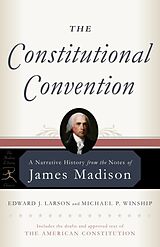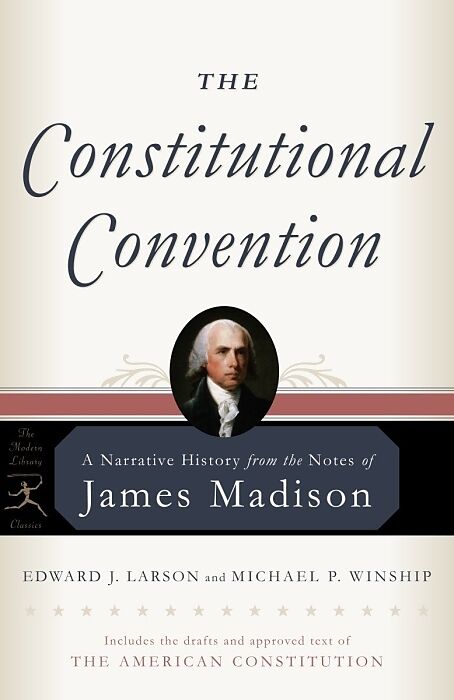The Constitutional Convention
Einband:
Kartonierter Einband
EAN:
9780812975178
Untertitel:
A Narrative History from the Notes of James Madison
Autor:
James Madison, Edward J. Larson, Michael P. Winship
Herausgeber:
Random House Group
Anzahl Seiten:
256
Erscheinungsdatum:
08.11.2005
ISBN:
0812975170
Informationen zum Autor Edward J. Larson is Russell Professor of History and Talmadge Professor of Law at the University of Georgia. He received the 1998 Pulitzer Prize for his book Summer for the Gods. His most recent book is Evolution: The Remarkable History of the Scientific Theory, published by Modern Library. Michael Winship, a specialist in early American history, is professor of history at the University of Georgia. He is the author of numerous books and articles. Klappentext In 1787, the American union was in disarray. The incompatible demands of the separate states threatened its existence; some states were even in danger of turning into the kind of tyranny they had so recently deposed. A truly national government was needed, one that could raise money, regulate commerce, and defend the states against foreign threats-without becoming as overbearing as England. So thirty-six-year-old James Madison believed. That summer, the Virginian was instrumental in organizing the Constitutional Convention, in which one of the world's greatest documents would be debated, created, and signed. Inspired by a sense of history in the making, he kept the most extensive notes of any attendee.Now two esteemed scholars have made these minutes accessible to everyone. Presented with modern punctuation and spelling, judicious cuts, and helpful notes-plus fascinating background information on every delegate and an overview of the tumultuous times-here is the great drama of how the Constitution came to be, from the opening statements to the final votes. This Modern Library Paperback Classic also includes an Introduction and appendices from the authors.Tuesday, May 29. [in convention] On May 29, the aristocratic thirty-five-year-old governor of Virginia, Edmund Randolph, took the floor to attack the Articles of Confederation and introduce a series of resolutions for a new Constitution. The mandate of the Convention was only to revise and amend the Articles, but Randolph's resolutions, known collectively as the Virginia Plan (see Appendix A), would scrap them and substitute a strong national government with final authority over what had been semi- independent states. The government would consist of a national legislature, judiciary, and executiveeach with the ability to check the others' power. The legislature would have two houses, or branches, with the larger one (the first branch) elected by the people and the smaller one (the second branch) elected by the larger one. The national legislature could veto state laws it deemed to violate the national Constitution, and it would choose the chief executive, who could veto the legislature's laws with the aid of a Council of Revision. Mr. Randolph then opened the main business. . . . He expressed his regret that it should fall to him, rather than those who were of longer standing in life and political experience, to open the great subject of their mission. But as the Convention had originated from Virginia and his colleagues supposed that some proposition was expected from them, they had imposed this task on him. He then commented on the difficulty of the crisis and the necessity of preventing the fulfilment of the prophecies of the American downfall. He observed that in revising the federal system we ought to inquire (1) into the properties which such a government ought to possess; (2) the defects of the confederation; (3) the danger of our situation; and (4) the remedy. The character of such a government ought to secure (1) against foreign invasion; (2) against dissensions between members of the Union or seditions in particular states; (3) to procure to the several states various blessings of which an isolated situation was incapable; (4) to be able to defend itself against encroachment; and (5) to be paramount to the state constitutions. In speaking of the defects of the confederation he professed a high respect...
Klappentext
In 1787, the American union was in disarray. The incompatible demands of the separate states threatened its existence; some states were even in danger of turning into the kind of tyranny they had so recently deposed. A truly national government was needed, one that could raise money, regulate commerce, and defend the states against foreign threats-without becoming as overbearing as England. So thirty-six-year-old James Madison believed. That summer, the Virginian was instrumental in organizing the Constitutional Convention, in which one of the world's greatest documents would be debated, created, and signed. Inspired by a sense of history in the making, he kept the most extensive notes of any attendee.Now two esteemed scholars have made these minutes accessible to everyone. Presented with modern punctuation and spelling, judicious cuts, and helpful notes-plus fascinating background information on every delegate and an overview of the tumultuous times-here is the great drama of how the Constitution came to be, from the opening statements to the final votes. This Modern Library Paperback Classic also includes an Introduction and appendices from the authors.
Leseprobe
Tuesday, May 29. [in convention] On May 29, the aristocratic thirty-five-year-old governor of Virginia, Edmund Randolph, took the floor to attack the Articles of Confederation and introduce a series of resolutions for a new Constitution. The mandate of the Convention was only to revise and amend the Articles, but Randolph’s resolutions, known collectively as the Virginia Plan (see Appendix A), would scrap them and substitute a strong national government with final authority over what had been semi- independent states. The government would consist of a national legislature, judiciary, and executive—each with the ability to check the others’ power. The legislature would have two houses, or “branches,” with the larger one (the “first branch”) elected by the people and the smaller one (the “second branch”) elected by the larger one. The national legislature could veto state laws it deemed to violate the national Constitution, and it would choose the chief executive, who could veto the legislature’s laws with the aid of a Council of Revision. Mr. Randolph then opened the main business. . . . He expressed his regret that it should fall to him, rather than those who were of longer standing in life and political experience, to open the great subject of their mission. But as the Convention had originated from Virginia and his colleagues supposed that some proposition was expected from them, they had imposed this task on him. He then commented on the difficulty of the crisis and the necessity of preventing the fulfilment of the prophecies of the American downfall. He observed that in revising the federal system we ought to inquire (1) into the properties which such a government ought to possess; (2) the defects of the confederation; (3) the danger of our situation; and (4) the remedy. The character of such a government ought to secure (1) against foreign invasion; (2) against dissensions between members of the Union or seditions in particular states; (3) to procure to the several states various blessings of which an isolated situation was incapable; (4) to be able to defend itself against encroachment; and (5) to be paramount to the state constitutions. In speaking of the defects of the confederation he professed a high respect for its authors and considered them as having done all that patriots could do in the then-infancy of the science of constitutions and of confederacies. . . . He then proceeded to enumerate the [confederation’s] defects: (1) that the confederation produced no security against foreign invasion, Congress not being permitted to prevent a war nor to support it by their own authority. Of this, he cited many examples. . . . (2) that the federal government could not check the quarrels between states nor a rebellion in a…

Leider konnten wir für diesen Artikel keine Preise ermitteln ...
billigbuch.ch sucht jetzt für Sie die besten Angebote ...
Die aktuellen Verkaufspreise von 6 Onlineshops werden in Realtime abgefragt.
Sie können das gewünschte Produkt anschliessend direkt beim Anbieter Ihrer Wahl bestellen.
Loading...
Die aktuellen Verkaufspreise von 6 Onlineshops werden in Realtime abgefragt.
Sie können das gewünschte Produkt anschliessend direkt beim Anbieter Ihrer Wahl bestellen.
| # | Onlineshop | Preis CHF | Versand CHF | Total CHF | ||
|---|---|---|---|---|---|---|
| 1 | Seller | 0.00 | 0.00 | 0.00 |
